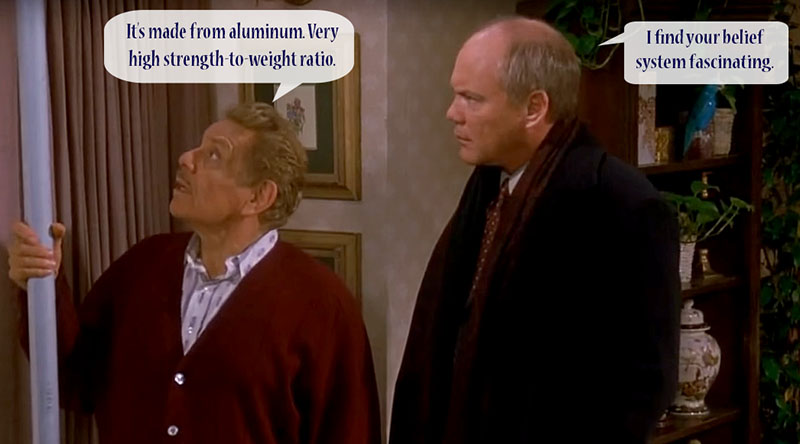by Dr. Nick J. Sciullo, J.D., Ph.D.
“I find your belief system fascinating.” – Mr. Kruger, Seinfield, “The Strike”
The holidays are upon us. In the United States, at least, the time between Halloween (end of October) and the end of January marks a time of presents, feasting, family gatherings, conspicuous consumption, parties, and festivals and fetes. Traditionally (for Christians), this time is considered Christmastime, despite other holidays like Hanukkah and Kwanzaa also having followings in the United States. Holidays are often times for merriment and excess, enjoyed by many but also deeply stressful and angst-ridden. Of course, historians have long studied holidays, exploring their cultural practices, evolution, legal standing, religious connections, and more.
The holidays have spurred a popular history industry with The History Channel, cooking shows, and even the nightly news churning out specials, episodes, and segments on the history of Halloween, Santa Claus and his international compatriots, and the myths surrounding Thanksgiving. Your favorite podcast has likely covered one of these days in the last several months. Media attention is great, and generally favorable save for the occasional Tickle Me Elmo fight.

On December 18, 1997, everything changed. On this date, on the National Broadcasting Corporation (NBC), the Festivus episode (actually called “The Strike”) of the sitcom favorite Seinfeld aired. Festivus, celebrated on December 23rd, was a new kind of holiday, one that dogged George Costanza, but perhaps more notably one that dogs capitalism to this day.
Frank Costanza, played by Jerry Stiller, introduces the audience to Festivus, “a holiday for the rest of us.” It is a holiday that the Costanzas celebrated because Frank objected to the religious and commercial aspects of Christmas. Now the episode seems quaint, given widespread concern about the ways in which religiosity seems to fuel capitalism and capitalism seems to fuel religion. Yet, in 1997, the episode was earth-shattering. At this time, there was only Black Friday and not Small Business Saturday and Cyber Monday. And, Black Friday started on Friday.
The anti-capitalism of Festivus was a marked departure from the increasing Christmas-ification of the winter season. Rather than the obligatory television Christmas episode, something many looked forward to every season, this was a positive politics of disruption—a challenge to Christmas as capitalist and religious bastion. Understanding Festivus means understanding that the episode and later celebrations were a rejection of both religion and capitalism in a media form that was also increasingly capitalist.
It was not just this new holiday, but the way the holiday was celebrated that gave it its persuasive power as anti-capitalist critique. There are two key practices in the Festivus tradition—the feats of strength and the airing of grievances. Both have a kitschy anti-capitalist, anti-religious feel, although they deserve more serious consideration. The feats of strength are a sharp contrast to the loving, caring nature of Christmas. One need not buy the best gift in a war of gift escalation, but one certainly must sweep the leg. Rather than compassion or giving to others, celebrants wrestle. In the feats of strength, one must pin the head of the household. Rather than the patriarchal worshipping of Santa Claus, Jesus, or dad with his pipe, Festivus redirects this reverence to revelry. This transgressive approach to the holiday season is still centered on the Father, but it also asked that people understand the Father as human. In this way, Festivus functioned as a direct indictment of the other-worldness of the Trinity.
“I got a lot of problems with you people and now you’re gonna hear about them.” – Frank Costanza, Seinfield, “The Strike”

The airing of grievances is starkly different from the mundane well-wishing of holiday cards or the hugs, pats on the back, and obligatory laughter of the distant-family or office Christmas party. One prominent rule during the holiday season is that one ought to not talk about politics. Festivus takes the personal as political seriously and redirects the obsession with niceness and cheer to an honest conversation about the ills of the world, and one’s relatives. As opposed to celebrating the year and one’s loved ones, the airing of grievances calls on participants to chastise those present. This makes Festivus attractive because it resists the obsession with happiness that is often a characteristic of capitalism. Rather than fool oneself into happiness with a new car or kitchen gadget, or spiked eggnog, Festivus celebrants embrace the reality of life’s ills.
Rather than the obligatory television Christmas episode, something many looked forward to every season, this was a positive politics of disruption—a challenge to Christmas as capitalist and religious bastion.
So powerful is the Festivus myth that it now has a cult following. Allen Salkin wrote a book, Festivus: The Holiday for the Rest of Us, in 2005. Others followed. Millennials flock to Festivus like they do to ugly Christmas sweater parties, many too young to have remembered Seinfeld and most who likely have never watched the episode. Its salience suggests something more than funny episode of acclaimed sitcom. Another anti-capitalist practice is Festivus’s promotion of the aluminum pole instead of the Christmas tree, magnified by the soaring prices of Christmas trees and their artificial counterparts. Gone are the lights, ornaments, and gaudy stars and angels—all horrible excesses of capitalism, neon signs pointing to over consumption. Millennials and their older relatives were not the only ones taken with the holiday, however. Wisconsin Governor Jim Doyle erected a Festivus pole in the Wisconsin Governor’s Mansion, which is now in the Wisconsin Historical Museum. Google now features the Festivus pole on the left-hand side of the computer window when one searches “Festivus” in Google. Festivus was not simply a one-off critique, instead it spawned a reexamination of the holiday season.

There is a theoretical basis for Festivus’s performance: Mikhail Bakhtin’s writing on the carnivalesque, which were based on a study of Middle Ages festivals, reveal humor’s significance to challenge orthodoxy. In the carnival, order changes to disorder, people dress up, hierarchies disappear, and participants perform in ways that were never possible during the rest of the year. The carnival was a time to let go, to make fun of the establishment, and to have fun. Festivus functions as a carnivalesque challenge to capitalist Christian orthodoxy. One of the reasons it has caught on as a holiday is that it challenges other holidays by mocking them. It relies on a tradition of mockery hundreds of years old.
No matter what one’s holiday predilections, Festivus has played and will continue to be an important countermeasure to the holiday season’s excesses. Historians would be well served to continue examining popular culture for clues about ideological shifts in cultural understanding. Television tells us a lot about what is going right and what is going wrong in society. This analysis of Festivus reframes Frank Costanza’s words as the episode ends into a call to arms against capitalism and religion: “Stop crying and fight your father.”
 Dr. Nick J. Sciullo, J.D., Ph.D. is the John F. “Jeff” Director of Debate and Lecturer in Communication at University of Central Florida. He earned the Best Dissertation Award from the Critical and Cultural Studies Division of the National Communication Association in 2016. His writings have appeared in dozens of journals, law reviews, and newspapers. He writes and speaks regularly on issues of race, class, and critical theory.
Dr. Nick J. Sciullo, J.D., Ph.D. is the John F. “Jeff” Director of Debate and Lecturer in Communication at University of Central Florida. He earned the Best Dissertation Award from the Critical and Cultural Studies Division of the National Communication Association in 2016. His writings have appeared in dozens of journals, law reviews, and newspapers. He writes and speaks regularly on issues of race, class, and critical theory.
* * *
Our collected volume of essays, Demand the Impossible: Essays in History As Activism, is now available on Amazon! Based on research first featured on The Activist History Review, the twelve essays in this volume examine the role of history in shaping ongoing debates over monuments, racism, clean energy, health care, poverty, and the Democratic Party. Together they show the ways that the issues of today are historical expressions of power that continue to shape the present. Also, be sure to review our book on Goodreads and join our Goodreads group to receive notifications about upcoming promotions and book discussions for Demand the Impossible!
* * *
We here at The Activist History Review are always working to expand and develop our mission, vision, and goals for the future. These efforts sometimes necessitate a budget slightly larger than our own pockets. If you have enjoyed reading the content we host here on the site, please consider donating to our cause.



Atheists already have April Fools day as a national Holy Day, why Festivus?
LikeLike
I’m gone to convey my little brother, that he should also pay a visit this weblog on regular basis
to get updated from most up-to-date news update.
LikeLike
Now I have that much more understanding of why people love Seinfeld as my daughter has and was able to watch most episodes at a young. (I didn’t.) My daughter is also an atheist analyzing and debating duplicity and propaganda.
Bravo!
LikeLiked by 1 person